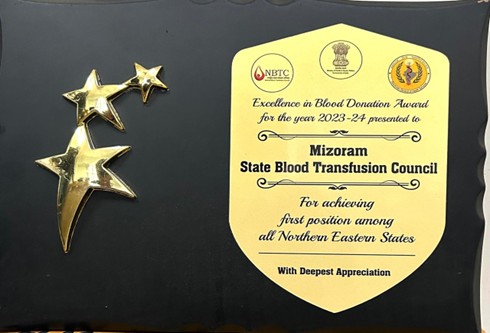Blood Transfusion Service (BTS)
Blood is an intrinsic requirement for health care and blood transfusion services (BTS) are an integral part of healthcare systems throughout the world. BTS in most countries is centralised and managed by Government and / or non – government organizations (NGOs).
BTS have to ensure that blood / components (Whole blood / Packed Red Cells / Plasma / Platelets) are :
· Available (Adequate blood collection to fulfil need)
· Accessible (Enough reach where it is needed)
· Affordable (At reasonable cost)
· Safe (Not cause harm, especially Transfusion Transmitted Infections TTIs )
· Standard Quality (Provide clinical gain)
The following basic conditions are required for ensuring the safety of blood used for transfusion :
1. Safe Donor
2. Safe blood / components
3. Safe transfusion
4. Hemovigilance
§ Since 1992 the entire BTS was entrusted to National AIDS Control Organization (NACO) as a blood safety programme. NBTC along with SBTC was set up in 1996 for monitoring the activity of Blood Centres in India.
§ Licensing of Blood Centres in the country was made mandatory in 1997.
§ The National Blood Policy was published by Govt. of India in 1992.
§ NACO Played a vital role in improving blood safety by infrastructure development, setting up component separation units, promoting Voluntary Blood Donation, controlling the infection rates, training of Blood Centre staff and also laid down standards for Blood Centres in India. BTS have been transitioned out from NACO and are now governed from within the office of Director General of Health Services, Ministry of Health & Family Welfare (MoHFW), Government of India.
BTS in India are managed by both Government and / or non – governmental organizations (NGOs). Majority of Blood Centres are hospital based. The aim is to have a blood supply which is collected from voluntary non – renumerated blood donors and the services are managed by a well – coordinated and networked blood transfusion service. BTS has been collaborating with the ICTCs and with National Viral Hepatitis Control Programme for early identification and appropriate management of TTIs. The Hemovigilance Programme of India has also grown tremendously and has been monitoring both recipient and donor adverse reactions, thus increasing both patient and donor safety.
SRUCTURE OF BLOOD CENTRES (State Level)
· Regional Blood Transfusion Centre : -Civil Hospital, Aizawl
· Model Blood Bank : -Civil Hospital, Aizawl
· Blood Component Separation Unit : -Civil Hospital, Aizawl
· Major Blood Banks : - Civil Hospital, Lunglei
· District Hospital Blood Banks:
-Saiha, Lawngtlai, Serchhip, Champhai, Kolasib, Mamit & ZMC
Charitable Blood Banks: (Supported by DGHS) : Synod Hospital Durtlang and Christian Hospital, Serkawn
BLOOD STORAGE CENTRES
• Ngopa
• Thenzawl
• Biate
• Sakawrdai
• Kawrthah
• Hnahthial
• Chawngte
• Vairengte
• Saitual
• Kulikawn Hospital
• Mizoram State Cancer Institute (MSCI), Zemabawk
• Trinity Hospital Aizawl
• Ebenezer Medical Centre Aizawl
The existing Blood Centres at the state are being strengthened by DGHS through supplying Testing Kits, Blood Bags, reagents etc. Improvement of infrastructure has been taken up by MSACS through DGHS. Additional manpower are also provided by MSACS in the form of Contractual employees. The state is having 11 Blood Centres to provide adequate , safe blood for the people.
To impart awareness to the public regarding Voluntary Blood Donation, Mizoram SACS, Blood Centres, Association for Voluntary Blood Donation ( with branches at all districts) have been working hard and with close cooperation ; conducting Awareness Campaigns , Voluntary Donation Camps, Training of Motivators etc. Voluntary Blood Donors have been contributed by the NGOs (like the YMAs, YLAs, MTPs ), Church Youth Organizations ( KTP, TKP, SAY, PYD, CTP, IKKTP etc ), members of NSS etc. which had resulted in increased momentum of Voluntary Blood Donation monement in our state, reaching above 93% Voluntary Blood Donation during 2024 – 2025. Target during 2025 – 2026 is 92% VBD.
IMPORTANT BLOOD DONATION DAYS
1. WORLD BLOOD DONOR DAY – 14th JUNE.
Ø Felicitation of Donors
Annual Blood Donor Awards were presented across various categories to commend exemplary contributions from individuals and organizations on occasion of World Blood Donor Day. Blood Donor Award are categorised in different group as :
Religious Category
YMA (NGO) Category
NSS (College) Category
NSS (Higher Secondary) Category
Miscellaneous Category
Ø Talk Show & Live Ph-in Program on VBD at DDK, FM Radio & Local Channels
2. NATIONAL VBD DAY – 1st OCTOBER.
Ø VBD Camps
Ø Concert among students for motivation
Ø Motivation Campaigns
Ø Talk Show & Live Ph-in Program on VBD at DDK, FM Radio & Local Channels
3. Valentines Day Blood Donation Camp – 14 February
Ø An innovative idea, Blood For your Valentine on 14th February every year since 2010 in collaboration with AVBDs and Blood Centres.
Excellence in Blood Donation Award - 1st October 2023
• State Blood Transfusion Council Mizoram awarded excellence award for achieving first position among North Eastern states.
• Felicitation ceremony in celebration of National Voluntary Blood Donation day at Jaipur on 1st October 2023.
